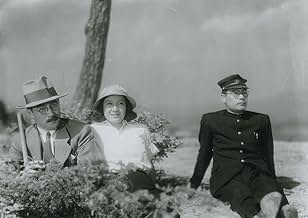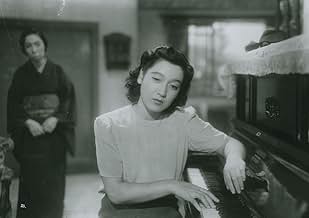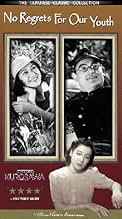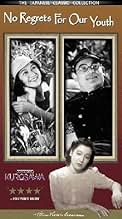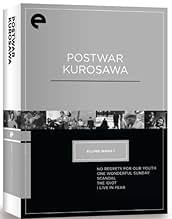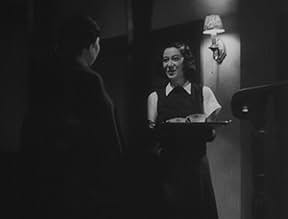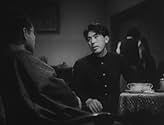The daughter of a politically disgraced university professor struggles to find a place for herself in love and life, in the uncertain world of Japan leading into WWII.The daughter of a politically disgraced university professor struggles to find a place for herself in love and life, in the uncertain world of Japan leading into WWII.The daughter of a politically disgraced university professor struggles to find a place for herself in love and life, in the uncertain world of Japan leading into WWII.
Featured reviews
Five years later, Noge visits Professor Yagihara and his family under the custody of the now Prosecutor Itokawa and tells that he is going to China. Yukie decides to move alone to Tokyo and years later, she meets Itokawa in Tokyo and he tells that Noge is living in Tokyo. Yukie visits Noge and they become lovers.
In 1941, Noge is arrested accused of ringleader of a spy network and Yukie is also sent to prison. When she is released, sooner she learns that Noge died in prison and she decides to move to the peasant village where Noge's parents live and are blamed of being spies by the villagers. She changes her lifestyle and works hard with Madame Noge (Haruko Sugimura) planting rice and earning the respect of her mother and father-in-law. With the end of the war, freedom is restored in the defeated Japan and the flowers blossom again.
Japanese militarists used the Manchurian Incident as a pretext to press the public for support to invade the Asian mainland. Any opposing ideology was denounced as "Red". The Kyoto University Incident a.k.a. Takigawa Incident was one example of this tactic.
Using this historical event and the Japanese tradition as background, Akira Kurosawa released in 1946 the fictional "Waga seishun ni kuinashi" a.k.a. "No Regret for Our Youth" to disclose the lack of freedom in Japan of those years. I do not recall in this moment any other film of this great director with such strong female character. Further, Kurosawa seems to be influenced by Yasujirô Ozu disclosing the relationship of Yukie with her family first and with Noge's parents in the second half of his story. My vote is eight.
Title (Brazil): "Não Lamento Minha Juventude" ("No Regret for Our Youth")
Kurosawa's oeuvre is generally chided for being too male-focused, but in Yukie, his only female protagonist, he gives us one of his finest heroes. Her transformation over the course of the movie is brilliantly played by Setsuko Hara. Her mannerisms and expressions allow her character to age credibly, more so than other movies I can think of where the audience watches a character age over many years. Yukie is idealistic, but also practical and steadfast.
As a film, NO REGRETS is executed with flair: Kurosawa has yet to develop his own signature style fully at this point in his career. I found a lot of debt to Soviet and European art cinema on display here, especially in the montages. He is not yet the master filmmaker he would become, but this is an astonishing early effort, heartfelt and assured. But it would be a shame to only see this movie as a stepping stone towards better things, for it is a fine piece of work in its own right.
"No regrets for my youth" tells the story of the fight of some students against the militarist regime in Japan and their different destinies throughout the years, but the film focuses mainly on Yukie, that we see in the beginning, just as a spoilt girl, flirting with revolutionary games. She's very sensitive and soon notices how alienated from reality she is. The military government is slowly tightening its iron grip and silencing the opposition. Idealism has become dangerous in Japan.
Yukie now sees what's happening. She's very passionate in whatever she does. Yukie makes no compromises, but she's no fool either. The film will describe her journey - first, the fires of adolescence when the world seems to be out there just to fulfill her wishes, then self-awareness, fight, disillusion, suffering.... She and her friends will arrive to different conclusions and tread different roads.
In a way, "No regrets for my youth" is a coming of age film, in which politics, emotion and sex play an important role. Yukie wants to find her place in the world. She's not satisfied with her life and she's not satisfied with the world in which she's living. She wants to change them. "No regrets for my youth" shows how she tries to live up to her ideals.
In "No regrets for my youth" (as I said before) we feel the influence the Soviet (and Italian) masters had on Kurosawa. We see here a young Kurosawa - more spontaneous and enthusiastic (another Kurosawa film, more or less, along the same line is "Stray Dog" that takes place in post-war Japan). The camera is used effectively to show the landscape and people. The acting is more natural. We are spared the exaggerated gestures and movements that are seen in some of his later films. Setsuko Hara who plays Yukie is an extraordinary actress. She helps the film to achieve a truly great emotional depth. Highly recommended!
In addition to the artistic filming itself, the script truly drives the story and leads us to believe more of what Akira Kurosawa believed -- anti-Fascism, anti-Militarism, through the portrayal of events concerning Japanese imperial rule in the film. Through the eyes of Yukie we learn what it is like to be oppressed, and we learn the strength of the human spirit in its' resolute resistance to the militarism and fascism of her day; the power of the will is truly highlighted in this film, and the persistent commitment to doing good (similar to that portrayed by Watanabe in Ikiru) is very present.
The flashbacks to youth, the conjuring of memories, and the portrayal of the good times right next to the bad times, and the depth of human emotion that is revealed truly makes this film something worth watching. Some of the emotionality of the scenes (especially Yukie's emotional moments) portrays the existential angst that we all have, and her strength & perseverance represent everything we would like to have. It was a truly impacting story.
I was especially keen on the ability of Akira Kurosawa to take some of the most inward, personal moments of extreme sadness and put them into the film and, without any seeming prior explanation, the viewer is able to relate in their own way. This film highlights a philosophy of oneself against the world, and the importance of being true to one self. The message was portrayed very clearly and the end result is a masterpiece of Cinema that is greatly overlooked.
I was very impressed by how the film made the characters convincing in both the first act where they are college students, and then again nearly 10 years later. The characters have changed not only in appearance but in personality and mannerisms. It made the passing years very convincing.
The film is interesting from both an historical viewpoint and as a pure drama. This was made just a year or so after the Japanese surrender in World War II, and we get a good feel for how the militaristic government in Japan was able to gain the unquestioning support of most of the population. Some things never change, do they?
Highly recommended, although if you are starting out on Kurosawa, you may want to try something from the 1955 to 66 period.
Did you know
- TriviaFilming in 1946, just after the war, many of the cast and crew were living very poor lives, going hungry quite often. One of the actors recalled a personal story of his stomach growling during filming, causing the scene to have to be shot again.
- Quotes
Title Card: After the Manchurian Incident the militarists attempted to unify domestic opinions in order to realize their ambition to invade Asia. They denounced as "Red" any ideology that might hinder their policy. Professors and students fought the suppression. The Kyoto University Disturbance was one of their struggles for freedom.
- How long is No Regrets for Our Youth?Powered by Alexa
Details
- Release date
- Country of origin
- Language
- Also known as
- Je ne regrette rien de ma jeunesse
- Filming locations
- Production company
- See more company credits at IMDbPro
- Runtime1 hour 50 minutes
- Color
- Sound mix
- Aspect ratio
- 1.37 : 1
Contribute to this page


